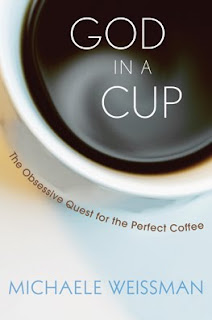'The powers of a man's mind are directly proportional to the quality of the coffee he drinks.'
- Sir James MacKintosh, 18th century philosopher
- Sir James MacKintosh, 18th century philosopher
I will admit, without hestitation, reservation of guilt, that I am addicted to that delicious hot and dark beverage known as coffee. It starts every morning, whether by drip or press, without adulterations of milk or sugar, energizing my body, mind, and spirit.
But where do those precious grounds of life originate? Who are the people bringing happiness to my morning? I hope that my purchase supports the farmer who made the beans, but most commonly, this is barely the case.
Yesterday, I purchased some coffee at the grocery store. I bought organic free trade coffee, 12 ounces for $10. Looking down the aisle, there was a Kroger brand can, 34 ounces for $4.88. And probably 2/3 of the coffee section were shelves of the cheaper fare. How could a farmer possibly earn anything at that price?!
The problem here (as is the case with feed-quality corn) is the circular degeneration of price and production. With profits driven by quantity, farms produce more to gain more. But with more made, prices diminish, so even more is produced, and round and round we go. Sound sustainable? Not really. Furthermore, to produce bigger yields, farmers generally shift from (traditional) shade grown coffee to (agro-industrial) direct-sun methods, which demand fertilizers as well. But such practices come at cost: clearing land (sometimes rain forest), creating a monoculture, and reducing biodiversity. Frankly, a cheap cup of coffee is not worth the cost of a rainforest.

So change the game: improve the quality of the coffee to improve profits. This strategy is exactly what the specialty coffee culture (I hesitate to call it an industry) in the United States is attempting to do. A few months ago, I read God in a Cup by Michaele Weissman, an exploration into the culture being created by the 'Third Wave' coffee guys. Passionate about coffee, these businessmen are still about profit, but not just for themselves. They recognize that to ensure continued production of great coffee means farmers producing it must both survive and see value in improving their coffee. Not an easy task, but with Starbucks popularizing a more expensive cup of coffee, people, lots of people, are demanding better taste than bitter burnt diner coffee. I'll leave you to read 'God in a Cup' to learn the intricate details of the new emerging coffee culture, but here's the basic needs for a sustainable coffee industry:
- Buyers, middle-men, and farmers who care
- Consumers willing to pay more for quality
- Farmers see value in improving quality
- Stable financial situation for farmers



You know where you can buy a $12.50 cup of coffee, literally? Hamden, Baltimore.
ReplyDeleteAlso, God in a Cup references the WK coffee baristas. Dad was SUPER excited when he came to visit.
ReplyDeleteYeah! I remember reading them and thinking, 'Oh! Oh! Maybe I'll get to enjoy some!' For those of you not familiar with Baltimore, WK is Woodberry Kitchen.
ReplyDeleteTrevor. Just read your whole blog, great writing. There is one answer to your whole project, or search for sustainability. Fishing. Don't laugh. Fish could be a renewable source of food for a few families in Breckenridge, but more importantly it would contribute to the physical and psychological sustainability of you as a person. The art of tying the flies and pursuing river fish in a way that allows you to provide enough food for a family encapsulates your desire to be able to have a creative outlet and pay attention to what you eat. Needless to say, their guts are compostable, but you can't compost them up here because of the bear attraction factor. So there you have it.
ReplyDeleteAlso, I would challenge the idea that your relationship to yourself is the deepest relationship that you will ever experience. As you know, my relationship to God is the deepest relationship I will experience and my number two relationship will be with my wife and my number three relationship will be with my friends and family. I, personally, would not include relationship to self as a category at all. Identity must be formed from communal relationships, whether with one other person, group of friends, or God. As I am sure you know it is a very modern idea to think that the "individual" is more important than "community" and this is often something that leads to people living unsustainable/selfish lives.
With all that to say I do think that a person needs to be reflective and identify who and what they have been formed by and evaluate if that is who they desire to become...maybe that could be considered someone's relationship to themselves?